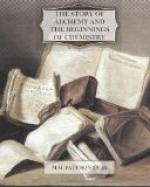the terms Element and Principle.
That attempt sufficed, at any rate, to show the vagueness
of the ideas which these terms were intended to express,
and to make evident the inconsistencies between the
meanings given to the words by different alchemical
writers. The story quoted in Chapter III., from
Michael Sendivogius, illustrates the difficulty which
the alchemists themselves had in understanding what
they meant by the term Mercury; yet there is
perhaps no word more often used by them than that.
Some of them evidently took it to mean the substance
then, and now, called mercury; the results of this
literal interpretation were disastrous; others thought
of mercury as a substance which could be obtained,
or, at any rate, might be obtained, by repeatedly
distilling ordinary mercury, both alone and when mixed
with other substances; others used the word to mean
a hypothetical something which was liquid but did
not wet things, limpid yet capable of becoming solid,
volatile yet able to prevent the volatilisation of
other things, and white, yet ready to cause other white
things to change their colour; they thought of this
something, this soul of mercury, as having properties
without itself being tangible, as at once a substance
and not a substance, at once a bodily spirit and a
spiritual body.
It was impossible to express the alchemical ideas in any language save that of far-fetched allegory. The alchemical writings abound in such allegories. Here are two of them.
The first allegory is taken from The Twelve Keys, of Basilius Valentinus, the Benedictine:—
“The eleventh key to the knowledge
of the augmentation of our
Stone I will put before you in the form
of a parable.
“There lived in the East a gilded knight, named Orpheus, who was possessed of immense wealth, and had everything that heart can wish. He had taken to wife his own sister, Euridice, who did not, however, bear him any children. This he regarded as the punishment of his sin in having wedded his own sister, and was instant in prayer to God both by day and by night, that the curse might be taken from him. One night when he was buried in a deep sleep, there came to him a certain winged messenger, named Phoebus, who touched his feet, which were very hot, and said: ’Thou noble knight, since thou hast wandered through many cities and kingdoms and suffered many things at sea, in battle, and in the lists, the heavenly Father has bidden me make known to thee the following means of obtaining thy prayer: Take blood from thy right side, and from the left side of thy spouse. For this blood is the heart’s blood of your parents, and though it may seem to be of two kinds, yet, in reality, it is only one. Mix the two kinds of blood, and keep the mixture tightly enclosed in the globe of the seven wise Masters. Then that which is generated will be nourished with its own flesh and blood, and will complete its course




